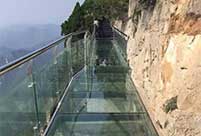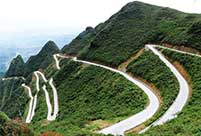

One needs to look no further than the banks along the Singapore River, which flows through the city-state's central business district, to see firsthand the results of its miraculous transformation into a modern-developed country.
Along this very river bank there is a bronze bust of late Chinese leader Deng Xiaoping, which was installed to commemorate the "special and intimate" relationship between Singapore and China.
This relationship was only possible thanks to Deng and late Singapore leader Lee Kuan Yew. The two great statesmen met in 1978 during Deng's visit to Singapore, which laid the foundation for an evolving bilateral relationship that has benefited the two countries, and the wider region, tremendously.
The Foreign Ministry has announced that President Xi Jinping will pay a state visit to Singapore from Nov. 6 to 7, inspiring many to reflect on the long, fruitful bilateral relationship.
Su Ge, president of the China Institute of International Studies (CIIS), hailed the Sino-Singapore relationship as a paragon of friendly cooperation between big and small countries.
Back in 1978, China was initiating the reform and opening-up drive. Thus, it was not just pure coincidence that drove Deng to explore the city-state's recipe for modernization.
Deng continued to voice his admiration of the Singapore model throughout the decades, most notably in speeches made during his south China tour in 1992, a tour which was the beginning of China's shift toward its socialist market economy.
On his part, Lee was no stranger to China either. During his multiple visits to the country, spanning nearly four decades, he met with generations of Chinese leaders. During one of these visits, to Beijing in May 2011, Lee was received by Xi, who was vice president at the time. Xi praised him as the founder of the bilateral relationship and an old friend of the Chinese people.
The current intimate relationship between Singapore and China has been cemented thanks to direct and continuous interaction from the leaderships of both countries. Formal relations were officially initiated in 1990.
After assuming the presidency in 2013, Xi has continued to maintain this relationship, meeting his Singaporean counterpart Tony Tan Keng Yam twice and Prime Minister Lee Hsien Loong twice.
Zheng Yongnian, director of the East Asian Institute at the National University of Singapore, said intergovernmental projects are the highlights of China-Singapore cooperation.
These intergovernmental projects are Suzhou Industrial Park and Tianjin Eco-City. Another project in west China is being considered.
Despite the decades old relationship, there is still plenty of potential for further cooperation.
Singapore is a major offshore Renminbi hub, and the "Belt and Road" initiative has opened up opportunities for Singapore in the globalization of Renminbi and overseas investment of Chinese companies. Singapore is also one of the founding members of the Asian Infrastructure Investment Bank.
Moreover, Singapore has always served as a bridgehead for cooperation between China and its fellow Association of Southeast Asian Nations (ASEAN) members.
The two countries signed the China-Singapore Free Trade Agreement in 2008, paving the way for the official completion of China-ASEAN free trade zone two years later. Now with soaring trade exchanges, China, Singapore and ASEAN are looking forward to upgrading cross-border economic cooperation.
Zheng Yongnian said the "Singapore Model" was known for its efficient economic and social management, the rule of law and clean governance. For China domestically, this model has been influential.
As China's reform and opening-up moves forward, a new consensus is forming in Singapore: A growing China presents Singapore an opportunity.
Koh Chin Yee, CEO of Longus Research Institute, said one of the reasons that Singapore had emerged as a pioneer of collaboration with China is that both share many cultural similarities .
Days before Xi's state visit, Xinhua spoke to a resident of Singapore, who gave his name as Hsu. Hsu said the two countries hold tremendous potential for development and Singapore should "piggyback" on China's economic development.
Editor's note:
Chinese President Xi Jinping will pay his first state visit to Vietnam and Singapore from Nov. 5-7 in a trip set to open up new prospects for China's relations both with the two countries and with Southeast Asia as a whole.
Xinhua is wiring a series of in-depth stories about the two-nation Asia tour, China-Vietnam and China-Singapore ties, and Beijing's neighborhood and overall foreign policy.
 When a Chinese woman marries an Indian man
When a Chinese woman marries an Indian man Love beyond limit of heights in the world
Love beyond limit of heights in the world
 Photos of beautiful teacher hit the Internet
Photos of beautiful teacher hit the Internet Transparent Over-cliff Path Cracked Suddenly
Transparent Over-cliff Path Cracked Suddenly Bride-to-be tries to save drowned man
Bride-to-be tries to save drowned man Russian helicopter lands safely after being attacked in Syria
Russian helicopter lands safely after being attacked in Syria Models change clothes on street in Hangzhou
Models change clothes on street in Hangzhou Winding mountain road
in China
Winding mountain road
in China In pics: army beauties across world
In pics: army beauties across world Top 20 hottest women in the world in 2014
Top 20 hottest women in the world in 2014 Top 10 hardest languages to learn
Top 10 hardest languages to learn 10 Chinese female stars with most beautiful faces
10 Chinese female stars with most beautiful faces China’s Top 10 Unique Bridges, Highways and Roads
China’s Top 10 Unique Bridges, Highways and Roads Aging gracefully
Aging gracefully Alternative education
Alternative education China’s domestic airliner deserves salute
China’s domestic airliner deserves salute Confucius Peace Prize will go on despite ridicule
Confucius Peace Prize will go on despite ridiculeDay|Week